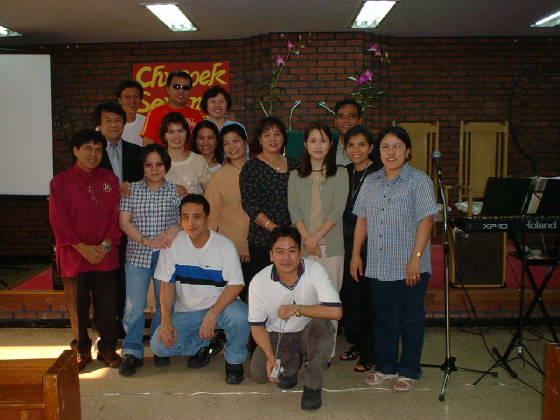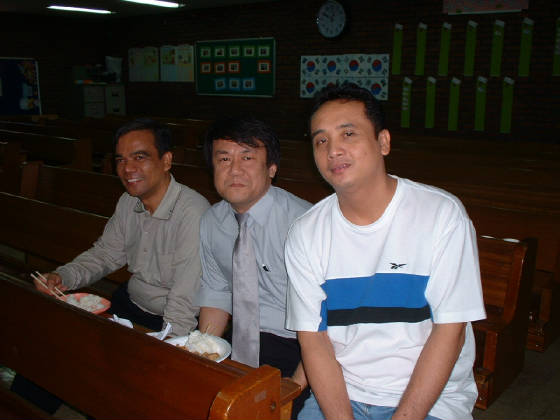

|
 |
|
What's Up Working with Migrants in Korea?
|
 |
|
|
 |
|
KANG NAM PRESBYTERIAN CHURCH
PRESBYTERIAN CHURCH IN THE REPUBLIC OF KOREA (PROK)
MIGRANT WORKERS MINISTRY
103-23 Shin Weol 1 Dong, Seoul, Korea
2004 YEAR-END REPORT
I. SUMMARY
The Migrant Workers Ministry in Kang Nam Presbyterian Church is characteristically unique in its dynamics.
It catered to mostly Filipino foreign workers employed in small and medium scale industries in the southwest portion of Seoul metropolitan area and some Filipino women married to Koreans. The cumulative 12 months program reached is
more than 200 persons, who have had contact by means of the personnel either personally, or through telephone and within the
distance of 20 square kilometers. The human services delivered to its participants-beneficiaries are:
1. Moral and ethical training for foreign workers primarily through teaching and preaching during worship
services, Bible studies, seminars and trainings
2. Counseling and mediation focused on the existential concerns of migrant workers such as those related
to employment like unpaid wages, interpersonal and social difficulties
3. Organized rest and recreation activities during the Choesuk or Korean thanksgiving holidays participated
in by 52 persons both Filipinos and Koreans
4. Pastoral care visitation during arrest and detention by immigration officials both in Mokdong and Hwasong
Detention Centres, in hospital and home visits
5. Job placement referral through networking among foreign workers and migrant worker centers
6. Mediation between the foreign workers and employers for unpaid wages and made requests for release papers
from employers for possible job transfer
7. Resource generation through weekly offerings and other fund sharing activities (donations/contributions)
on special occasions and immediate concerns
8. Documentation assistance such as facilitation of renewal of passport and travel documents
For one year the ministry has continued reaching out to migrant workers in their homes and factories. The weekly services
in the church serve as the centre of spiritual nurture and the gauge of committed spirituality. The various monthly and annual
festivities and special occasions have encouraged migrant workers to actively participate, mobilize their resources and optimize
their talents and skills especially in music and social networking. The apparent constraint in the migrant workers’
participation in the weekly and other celebrations is their work in the factory. Some factory owners or employers would call
their workers to work even on Sundays and holidays.
Another intervening factor is the ongoing crackdown on undocumented migrant workers. One can imagine how a
mechanized embroidery factory ceased to be a centre for Bible Study after it was raided by immigration officials. Consequently,
five (5) Filipino women workers were arrested, detained and deported to the Philippines. The five women attended and actively participated in church services. The extent of anxiety the undocumented
workers suffer cannot be downplayed for even in their homes a knock on the door gives them quivers.
|
 |
 |
 |
 |
 |
|

INCLUSION OF MIGRANT WORKERS IN THE KOREAN GOVERNMENT
MEDICAL INSURANCE SYSTEM BY 2006
Source: Korea Herald, April 09, 2005
The government and the ruling party have agreed to include migrant workers in the state-run medical
insurance system that makes it compulsory for employers to pay half of worker's health insurance payments. The expansion of
health insurance is expected to take effect next year after approval by the National Assembly.
The new system may add burden to companies hiring migrant workers but we concluded that it
is a matter of course for the nation to match the international standard on safeguarding human rights, said Uri Party member
Rhee Mok-hee.
Illegal workers will not be allowed to sign up for national health insurance. Under the current law,
only foreign employees with general work permits qualify for compulsory health insurance while those without proper work permits
are not covered. And, even those with work permits are often excluded from the health insurance due to company situations
and ignorance of such a system. The government estimates more than 250,000 foreigners working in Korea.
------------
COMMENTS
1. This is good news whenever this will be fully implemented. But there is no such thing as perfect
medical insurance system. As mentioned in the press release, there is ignorance among employers about workers coverage
of medical insurance and the pparent lack of implementing guidelines in many of the Korean government policies related
to the welfare of migrant workers aside from the step by step crackdown the undocumented ones.
2. It was not long ago that foreign workers who contributed to the Korean pension plan and decided
to go home to their home countries were not even refunded of all their contributions. If this medical insurance benefit will
be fully inplemented, this will be an additional burden on the part of the foreign workers. More so, there is no assurance
that employers will also give their share to the insurance. My apprehension is based on the fact that there arevmany employers
who fail to pay the wages of their workers both native Koreans and foreigners.
3. This is quite a lucrative business for the Korean government and for all those who will involved
in this business. Working for the interests of the migrant workers, I cannot prevent myself casting doubt about the effectivity
of this scheme. The labor situation itself in Korea and that in the sending countries that create undocumented migrant
workers and the workers sshould be doubly penalized for ineffective strategies. It is not just those who are legal workers
who can get ill, undocumented workers much more get ill and need protection of their rights. Come to think about it!
|
|
|
 |
|
COUNSELING SERVICES
Counseling Filipino Women Spouses of Korean men is one
of the services we render to the community here in Seoul, Korea. In the context of community life we try to assist women in
the marital crisis situation and in helping them understand the cultural dynamics as experienced in marriage and family life.
|
 |
|
|
|
|
 |
 |
 |
|

IMPACT OF INTENSIFIED CRACKDOWN ON THE MINISTRY TO
UNDOCUMENTED MIGRANT WORKERS
So who wants to hire undocumented or "illegal" migrant workers in South Korea? As of last year
(2004) there are 188,000 undocumented alien workers in South Korea and based on last year's joint statement of the Ministry
of Justice and Ministry of Labor, a large portion of them should be flushed out through integrated approaches of the various
government agencies, including the local police.
Convincingly the Ministry of Labor has made its message clear to all employers to discourage
hiring illegal alien workers. Many migrant workers were already deported since August last year, but the Ministry of Justice
has not disclosed to mass media outlets how many were flushed out from the country and the pyschological impact the crakdown
have on migrant workers.
Lately, the Ministry of Labor and the Ministry has enticed undocumented migrant to voluntarily
depart from Korea with an incentive that they can come back again to get employment from South Korea. Judge for yourself what
these two different press relaeses the two government agencies have pasted below:
CRACKDOWN ON
ILLEGAL WORKERS
The Ministry
of Justice (MOJ) and the Ministry of Labor (MOL) agreed to formulate and implement measures to reduce illegal foreign workers
to address problems over increasing number of illegally staying foreigners (despite the implementation of the EPS and on-going
crackdowns on illegal residents) as foreigners whose periods of sojourn are expired among the legalized in 2003 avoid departure,
to establish law and order pertaining to foreigners in Korea and to firmly root the EPS.
The MOJ reaffirmed its commitment
to a continuous and consistent crackdown and stern punishments of illegal residents. To that end, it plans to enhance the
joint control system with relevant government agencies, establish an exclusive investigation system focused on brokers of
illegal employment, intensify criminal punishments of bad employers and operate a hotline (1588-7191) around the clock.
The
ministry said that under a continuous and consistent policy direction, it put 26 control divisions in place across the nation
in conjunction with related government agencies such as the prosecution and police and set up a taskforce team in 5 metropolitan
prosecutor’s offices that investigates brokers of illegal employment.
Meanwhile, concerned agencies including
the Ministry of Labor and the Korea National Statistical Office agreed to strengthen organic cooperation sharing responsibilities
of analyzing trends, visiting workplaces to give direction and administrative guidance, and reporting detected violations
to a joint control division.
The ministry said that it decided to step up criminal punishments of unethical employers
who engage in a delay in payment, repeated illegal employment, and employment of illegally staying foreigners in large numbers.
It also said that an amendment to the Immigration Control Act that aims to punish both violators and the company in question
for a false invitation or illegal employment in order to punish employers who clearly lack a law-abiding spirit was submitted
to the National Assembly and passed on March 2, 2005.
In addition, the MOJ and MOL agreed to induce voluntary
departure of foreign workers legalized in 2003, considering that their periods of sojourn expire in August 2005. Voluntary
departers within their sojourn period will not only be included first on the roster of job-seekers under the EPS but also
be re-hired at the currently working workplace after reentry and their grace period of reentry will be cut from 1 year to
6 months. Employers who made foreign workers voluntarily depart Korea within their period of sojourn will be allowed to hire replacement workers as many as the number
of departers regardless of the quota by business size.
The grace period of reentry will be drastically eased so that
even illegal residents receive an exemption of fine if they voluntarily depart Korea and an approval of reentry after a certain period. The two ministries plan to devise
and implement concrete measures to permit employers who make illegal workers depart voluntarily to immediately and legally
hire foreign workers.
The MOL produced improved measures for the EPS to supply replacement workers of legalized voluntary
departers on time and to help employers use the EPS conveniently.
① 1 Workplace 1 System Principle that allows employers to choose either the EPS or the Industrial
Trainee System will be abolished in order to ensure a smooth supply and demand of workforce and maximize the use of foreign
workers.
②
The quota for businesses with 4 or less native employers will be expanded from 2 to 5 by integrating them into the same category
of businesses with 10 or less workers in order to ease labor shortages in the industry due to limited quotas by business size
and the ceiling of no more than 50% of native workers insured on the number of foreign workers was lifted.
Present
measure Improved measure
Number of natives insured Quota Number of natives insured Quota
4 or less 2or less 10 or
less 5 or less
5~10 5 or less
No more than 50% or native workers insured Rescinded
③ The obligation period of seeking native workers will also be cut from a month to
7 days. In case an employer offers jobs through the mass media such as newspapers or advertisements for over 3 days, the period
can be shortened to 3 days.
④ A probation period (3 months) will be introduced for foreign workers
who enter Korea for the first time to improve their language proficiency, work adaptability and productivity and to curtail
the period of entry. One-stop agency service from job offer to entry will be available for employers to reduce costs of hiring
foreign workers and receive more convenient service.
※ Currently, administrative scriveners carry out employment permit
procedure on behalf of employers for KRW100,000~200,000 per case. If the HRD-Korea provides the service, the cost will drop
sharply to KRD15,000 per case reducing the burden of employers.
The two ministries agreed that employing illegal foreign
workers will no longer be tolerated citing difficult economic situation or labor shortages since legal ways to hire foreign
workers are now available and they reaffirmed that activities that trigger illegal stays or illegal employment will be strictly
dealt with.
Meanwhile, the MOJ and MOL were of the same opinion to try hard not to violate the rights of even illegal
foreign workers while making all-out efforts to establish order pertaining to status of sojourn and employment of foreign
workers and decided to provide opportunities of voluntary departure to people who need humanitarian support such as the weak,
the elderly or pregnant women during crackdown operations.
As part of such efforts, 300 staff members of the MOJ,
the MOL and the Korea National Statistical Office will begin joint activities of providing guidance in March, 2005.

RE-ENTRY ENTICEMENT
Replacement
workers as many as voluntary departers will be quickly supplied to minimize a manpower vacuum in the industry.
To
induce a smooth departure of 110,000 foreign workers whose periods of sojourn will be expired in end-August 2005 among workers
legalized in 2003, the Ministry of Labor plans to allow voluntary departers early re-entry by ①shortening their grace period of re-entry and ②including them first on the roster of job-seekers under the EPS. Also, employers who cooperate
in encouraging voluntary departure of legalized foreign workers will be given an incentive of a guarantee of replacement workers.
Incentives for foreign workers who voluntarily depart Korea within their sojourn period
Voluntary departers will be
included on the roster of job-seekers first under the EPS. The grace period of re-entry will be cut from current 1 year to
less than 6 months to induce voluntary departure through an early re-entry incentive. Meanwhile, job-seekers will be allowed
to be employed at the workplace where they used to work upon a request of an employer in order to make use of skilled workforce.
Foreign workers who voluntarily depart Korea within their sojourn period shall report it to the employment security center concerned first. After that, they can
have a Recommendation Letter of Voluntary Departers for the List of Job-seekers issued and get “a departure stamp”
at airports or ports before departure.
The departers could request their country's concerned agency (sending agencies,
etc.) to include them on the roster of job-seekers under the EPS by presenting the recommendation letter and will be allowed
to re-enter Korea after a grace period.
※ The Korean government will ask sending countries to include the departers in question on
the 2005 roster of job-seekers without fail.
①Request
for a Recommendation Letter of Voluntary Departers for the List of Job-seekers (foreign workers) → ②Issuance of the recommendation letter(Ministry of Labor) → ③Confirmation of departure at airports or ports(Ministry of Justice) → ④Registration on the roster of job-seekers(sending countries) →
⑤Reentry after the grace period of reentry(re-employment of foreign
workers at the same workplace where they used to work is possible upon the request of employers is allowed). Incentives for employers who cooperate in encouraging voluntary
departure within periods of sojourn.
Employers
are guaranteed to hire replacement workers as many as their voluntary departers under the EPS regardless of a quota based
on business size. For this, employers shall first submit an “Agreement for Cooperation in Voluntary Departure”
for foreign workers whose periods of sojourn are nearing to the concerned employment security center. Upon the start of the
process to hire foreign workers such as seeking native workers first, employers can hire foreign workers as many as the number
of departers.
Meanwhile, the process of replacing departers with new foreign workers
before existing workers’ departure will be accelerated to minimize a vacuum at workplaces that request for replacement
workers. In case the entry of new replacement workers does not seem to be made within the sojourn period of departing workers,
the sojourn period of departing workers will be extended up to 30 days(Ministry of Justice).
In addition, the government
will support the reuse of skilled workers by allowing employers to re-hire foreign workers who previously worked for them
upon a request of an employer.
①Submission
of an Agreement for Cooperation in Voluntary Departure for departers whose expiration of sojourn period is approaching(employers)
→ ②Registration to offer a job(employers
who intend to hire legal foreign workers) → ③Request
and issuance of the confirmation on workforce shortages and an employment permit(confirmation of the number of departers scheduled
through agreements for cooperation and recommendation letters for reentry) → ④Entrusting entry procedure such as signing a labor contract → ⑤Request and confirmation for an extension of sojourn period(if necessary)(Ministry
of Labor) and approval of an extension of stay(Ministry of Justice) → ⑥Entry and placement of new legal foreign workers → ⑦Departure of scheduled departers → ⑧Registration of voluntary departers on the list of job-seekers(employers may re-hire workers who
previously worked for them upon request)
Attachment
Main Elements of Improved Measures for the EPS
① 1 Workplace 1 System Principle that allows employers to choose
either the EPS or the Industrial Trainee System will be abolished in order to ensure a smooth supply and demand of workforce
and maximize the use of foreign workers (Ministry of Justice).
②
The quota for businesses with 4 or less native employers will be expanded from 2 to 5 by integrating them into the same category
of businesses with 10 or less workers in order to ease labor shortages in the industry due to limited quotas by business size.
③ From March 12, 2005 onward, the obligation
period of seeking native workers will also be cut from a month to 7 days. In case an employer offers jobs through the press
such as newspapers and advertisements over 3 days, the period can be shortened to 3 days.
④ A probation period (3 months) will be introduced for foreign workers
who enter Korea for the first time to improve their language proficiency, work adaptability and productivity and to curtail
the period of entry. One-stop agency service from job offer to entry will be available for employers to reduce costs of hiring
foreign workers and receive more convenient service.
▶ Process
of hiring foreign workers
①Efforts to hire domestic workers
→ ②Request and issuance of the confirmation
on workforce shortages → ③Request and issuance of an employment
permit → ④Signing a labor contract →
⑤ Request and issuance of the approval of visa issuance→ ⑥Entry(workers are sent to job training centers) → ⑦Job training → ⑧Placement to workplaces
◈Agency service before change: ④~⑥, ◈Agency service
after change : ①~⑥
⑤ The Korean
Language Proficiency Test will be used from August 2005 in sending countries to select job-seekers who are fluent in Korean
and to shorten hiring period of foreign workers.
|
|

